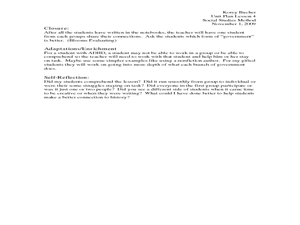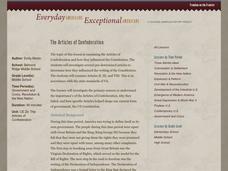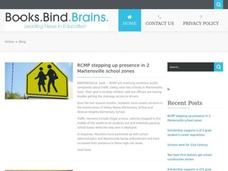Curated OER
Lesson 2: The Tired King
Students are introduced to the three functions of government (legislative, judicial, and executive). They read and discuss a story about an overworked king who must handle all the tasks of government. Students give a description of the...
Curated OER
Types of Branches
Fourth graders study the three branches of government. In this politics lesson, 4th graders list the three branches of government, understanding what each branch does, and compare and contrast how government is run with how the school is...
Curated OER
Presidential Gallery
Students identify the three branches of the federal government and their role in our government. They identify important events and accomplishments in the life of one president of the United States. Students identify the major national...
Curated OER
The Home Front: Convincing Americans to Help America Prepare
Sixth graders examine the actions of the U.S. Government after the attack on Pearl Harbor. In this preparation for war instructional activity, 6th graders analyze WWII posters and view a clip on the American Home Front. Students discuss...
Curated OER
A New Federation
Students describe the relationships between state and federal parliaments in Australia. They identify responsibilities shared between federal and state and territory governments. Students explore an alternative federal structure by...
Curated OER
Separation of Powers
Students examine the separation of powers in local and federal government. Using case studies, they review several instances of separation of powers. After reading the case studies, they write a brief opinion essays supporting their...
Curated OER
Treaties
Sixth graders research treaties. For this treaties lesson, 6th graders go online to build knowledge about treaties. Students read information and take quizzes. Students write a comparative essay about how the Aboriginal and Government...
Carolina K-12
Choice, Conflict, and Compromise at the County level
With all the hubbub surrounding national elections, it's easy to forget the importance of local government. After learning about county governance and voter turnout for local elections, young citizens demonstrate how local governance...
C-SPAN
Middle School Checks and Balances
Seven video clips reveal how the checks and balances built into the constitutional framework of the United states' government are designed to keep any one branch from becoming too powerful. After watching each clip, groups identify the...
National Endowment for the Humanities
Lesson 4 James Madison: Internal Improvements Balancing Act—Federal/State and Executive/Legislative
Who has the power? The founding fathers asked the same question when the United States was formed. Learners explore issues that arose during Madison’s presidency that raised constitutional questions. Through discovery, discussion, and...
Roy Rosenzweig Center for History and New Media
The Articles of Confederation
Have you ever started a project only to realize you need to scrap it and start over? Scholars analyze the issues leading to the fall of the Articles of Confederation. A group investigation into Articles II, III, and VIII unveil the...
The New York Times
Where to Draw the Line: Balancing Government Surveillance with the Fourth Amendment
The question of how to balance Fourth Amendment Rights with national security concerns becomes critical in an age of planned terrorist attacks, election interference, and fake news. Get young social scientists involved in the debate with...
Curated OER
Lesson 4: The Judiciary: A Brief Introduction to the Courts System
Focusing on the judicial branch of government, the fourth lesson in this series explores the structure of the US courts system. Beginning with an engaging activity based on the short story The Lady or the Tiger, students go on to examine...
Center for Civic Education
What Is Authority?
Young scholars examine the concepts of power and authority as they begin learning about government in this elementary social studies lesson. Through a series of readings, discussions, and problem solving activities, children learn about...
Curated OER
Governance
First graders make connections between the purposes of rules. In this governing lesson plan students listen to a story about rules being broken. Students identify rules that they have at school or home.
Annenberg Foundation
Electoral Politics
You won't just get a lesson when you click on this resource. As you click on the related resources located to the left of the screen, you'll find, a professional development video, teacher/student notes, lesson plan, and related reading...
Cornell University
Fibers, Dyes, and the Environment
Nanofibers can be made through electrospinning or force spinning in order to reduce the negative impact on the environment. Pupils study the role of fibers and dye on the environment through a series of five hands-on activities. Then,...
Roy Rosenzweig Center for History and New Media
Reconstruction
When slavery ended, what did the government do to help African American during Reconstruction? An interesting instructional activity uses primary sources such as newspaper articles to help scholars analyze Reconstruction policies and how...
iCivics
Separation of Powers
In a fun and informative simulation, your learners will act in groups as lead chefs, menu writers, and nutrition inspectors in deciding a new school lunch menu. They will then compare and contrast their experience to the interaction...
Digital History
The Age of Constitution Writing
Was the United States significantly more democratic in their governing structures and laws after the overthrow of British authorities? Compare and contrast summaries of the country's constitutions under British rule and after...
Carolina K-12
Principles of the US Constitution
After breaking into groups according to major principles of government (i.e., popular sovereignty, separation of powers, checks and balances, etc.) in the United States, your class members will produce public service announcements...
Curated OER
Lesson 2: The Constitution: Our Guiding Document
Explore the structure and content of the US Constitution in the second lesson of this five-part social studies series. A collection of activities, games, and videos complement a class reading of a document summarizing the US...
City University of New York
Urban Politics: Machines and Reformers
Take a trip to the turn of the twentieth century with a resource about industrialism in America. With primary source documents and focus questions, learners think about the ways that government groups and organizations paved the way for...
Constitutional Rights Foundation
270 Votes to Win: The Electoral College in the United States
What exactly is the Electoral College and how does it work? The lesson plan is part of a larger series on government that explains what the Electoral College is and how it helps determine an election winner. Academics participate in...
Other popular searches
- U.s. Government
- Branches of Government
- Three Branches of Government
- 3 Branches of Government
- Types of Government
- State Government
- Forms of Government
- Local Government
- Canadian Government
- Us Government
- Government Agencies
- American Government

























